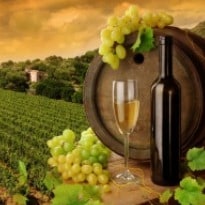Despite the conflict that has been tearing Syria apart since 2011, brothers Karim and Sandro Saade continue to supply one of the most difficult and expensive-to-produce wines in the world - Domaine de Bargylus. It's of premium quality, elegant and served in Michelin-starred restaurants of London and Paris.These ambitious entrepreneurs come from a Syrian Orthodox Christian family and own a vineyard that is 20 hectares big and located in the Mediterranean province of Latakia. Latakia is also one of the government strongholds in Syria and has so far been spared the intense clashes that occur in other parts of the country."On a couple of occasions, shells have fallen into our property from nearby fighting, but they only caused slight damage", explains Karim in an interview with Efe news agency, in the Beirut office of his company, the Saade Group.
In fact, recent clashes, which took place a few months ago, were just a mile away from the farm. During the conversation, the word most used by Karim, who is accompanied by his brother Sandro, is challenge to refer to a business venture they launched in 2004, a decision that was not without its sentimental reasons."Our parents were lovers of wine and instilled it into us. My father wanted to invest in Bordeaux, France, but it was far away and they finally decided to establish something in Syria and Lebanon," recalls Karim.Since March 2011, when the conflict broke out, the brothers were unable to step on Syrian soil, creating many complications. Simple things like tasting the fruit before harvest became complicated, "Now, we bring grapes to Beirut in refrigerated tanks."The brothers hired a staff of 20 "faithful and courageous" workers, as described by Karim, and compensated them with a rise in wages, due to the devaluation of the Syrian pound.The war has hindered the production of wine, but it was not easy even before 2011, being a pioneer project for Syria.For starters, the Saade brothers faced the challenge of acquiring a large enough tract of land, because the land in Latakia is divided into small plots by an agricultural reform law dating from the middle years of the last century.In Syria, there were no specialised laboratories for quality wines for export, because production was concentrated in monasteries and state warehouses intended for domestic consumption, so from the beginning, they had to transport samples for analysis to Lebanon and France.There was also the need to train staff from scratch, having no oenology experts in Syria.But to be sure, logistics have been the main headache of the Saade brothers, both before and during the war. Currently, the bottles are transported out of Syrian territory by road or by sea "from Latakia, to the Egyptian port of Damietta and then to Lebanon", explains Karim.Their final destination may be one among the most lavish restaurants and liquor stores in Britain and France. The philosophy of the Saade brothers is 'limited production and good quality', so they only produce about 55,000 bottles per year.Spain could be the next European market for their wine and its "Lebanese brother", Château Marsyas, is grown in the eastern Bekaa valley, where security is another concern on account of its proximity to Syria.Still, to Karim, the sacrifices are worthwhile: "We do not regret anything; we're doing something in tune with our culture, our land and our history."
In fact, recent clashes, which took place a few months ago, were just a mile away from the farm. During the conversation, the word most used by Karim, who is accompanied by his brother Sandro, is challenge to refer to a business venture they launched in 2004, a decision that was not without its sentimental reasons."Our parents were lovers of wine and instilled it into us. My father wanted to invest in Bordeaux, France, but it was far away and they finally decided to establish something in Syria and Lebanon," recalls Karim.Since March 2011, when the conflict broke out, the brothers were unable to step on Syrian soil, creating many complications. Simple things like tasting the fruit before harvest became complicated, "Now, we bring grapes to Beirut in refrigerated tanks."The brothers hired a staff of 20 "faithful and courageous" workers, as described by Karim, and compensated them with a rise in wages, due to the devaluation of the Syrian pound.The war has hindered the production of wine, but it was not easy even before 2011, being a pioneer project for Syria.For starters, the Saade brothers faced the challenge of acquiring a large enough tract of land, because the land in Latakia is divided into small plots by an agricultural reform law dating from the middle years of the last century.In Syria, there were no specialised laboratories for quality wines for export, because production was concentrated in monasteries and state warehouses intended for domestic consumption, so from the beginning, they had to transport samples for analysis to Lebanon and France.There was also the need to train staff from scratch, having no oenology experts in Syria.But to be sure, logistics have been the main headache of the Saade brothers, both before and during the war. Currently, the bottles are transported out of Syrian territory by road or by sea "from Latakia, to the Egyptian port of Damietta and then to Lebanon", explains Karim.Their final destination may be one among the most lavish restaurants and liquor stores in Britain and France. The philosophy of the Saade brothers is 'limited production and good quality', so they only produce about 55,000 bottles per year.Spain could be the next European market for their wine and its "Lebanese brother", Château Marsyas, is grown in the eastern Bekaa valley, where security is another concern on account of its proximity to Syria.Still, to Karim, the sacrifices are worthwhile: "We do not regret anything; we're doing something in tune with our culture, our land and our history."
Advertisement







